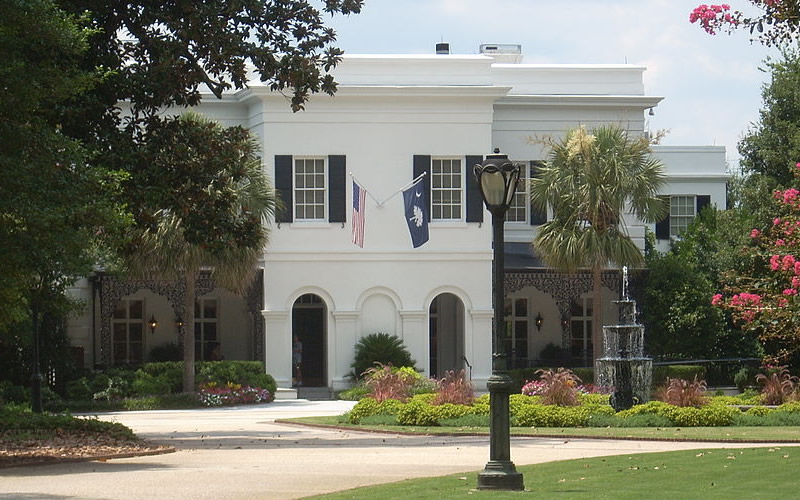By Andy Brack, editor and publisher | Don’t look for too many surprises Tuesday in what’s been a pretty lame set of gubernatorial primaries.
 Unless something surprising happens before the June 12 Republican and Democratic primaries, incumbent Gov. Henry McMaster will lead four challengers and be forced into a runoff while Democratic state Rep. James Smith of Columbia may just muster enough votes to win the party’s nomination outright.
Unless something surprising happens before the June 12 Republican and Democratic primaries, incumbent Gov. Henry McMaster will lead four challengers and be forced into a runoff while Democratic state Rep. James Smith of Columbia may just muster enough votes to win the party’s nomination outright.
This wouldn’t necessarily be a bad result. Why? Because in the long term, state residents would become the ultimate victors.
McMaster and Smith are seasoned leaders who know how to get things done across the aisle. In short, they’re part of the establishment, unlike other candidates who are pumping hundreds of thousands to millions of dollars into efforts as they run against the legislature to try to win the state’s top elected position.
The problem with continuously launching verbal grenades against the “corruption” and good-old-boys of Columbia might sound good now to voters, but it doesn’t work well after an election for anyone who wants to get things done. In a legislatively-controlled state. Do you really think state senators and representatives are going to open their arms to a new governor who has spent months talking trash about them?
Two recent anti-legislative governors provide more than enough examples. During eight years of office, former Gov. Mark “No” Sanford tried to cut state government time and again. Throughout his tenure, he nixed ideas of investing in infrastructure, such as maintaining college campuses. Since 2002, the state hasn’t had a bond bill – even though cheap interest rates and a good credit score make it fiscally sound to borrow, make improvements now and pay pack over time. Meanwhile, state colleges and universities have identified $2.5 billion in deferred maintenance and infrastructure needs.
Former Gov. Nikki “No Squared” Haley early approached state government in a Sanfordian manner, saying no time after time to improving state roads by boosting the gas tax – even though polls showed an overwhelming number of South Carolinians would pay more at the pump to fix potholes and smooth congestion. Boosted highway coffers didn’t come until Haley went to New York to serve as the nation’s ambassador to the United Nations.
 In the Republican primary, McMaster and former Lt. Gov. Yancey McGill of Kingstree represent the establishment. Catherine “Buzzkill” Templeton of Mount Pleasant and Greenville businessman John Warren, who has put millions of his own money into the race, are so blinded by rooting out corruption that the rest of their campaign rhetoric – the stuff about making government work – is thin, at best. McGill, like current Lt. Gov. Kevin Bryant of Anderson (who hops back and forth between the establishment and renegades) are at the bottom of polls. Prediction a week out: McMaster will be in a runoff with Warren.
In the Republican primary, McMaster and former Lt. Gov. Yancey McGill of Kingstree represent the establishment. Catherine “Buzzkill” Templeton of Mount Pleasant and Greenville businessman John Warren, who has put millions of his own money into the race, are so blinded by rooting out corruption that the rest of their campaign rhetoric – the stuff about making government work – is thin, at best. McGill, like current Lt. Gov. Kevin Bryant of Anderson (who hops back and forth between the establishment and renegades) are at the bottom of polls. Prediction a week out: McMaster will be in a runoff with Warren.
On the Democratic side, Smith faces Florence tax lawyer Marguerite Willis and Charleston consultant Phil Noble. Smith, long considered the frontrunner, has served two decades in the S.C. House of Representatives and has respect among Democratic and Republican state lawmakers. Willis, who wants the state to deal with endemic issues like poverty, talks about ending the old way of doing things. Noble, who doesn’t have enough money to advertise on TV, blasts “plantation politics” and the gun culture as South Carolina’s version of Bernie Sanders. Smith, not the most charismatic candidate on the stump, has a seasoned team with an organized playbook and big endorsements that might get them over the hump to win the primary without a runoff. It will be close. Otherwise, he’ll face Willis on June 26 in a primary runoff.
South Carolina needs to get off the bottom of all sorts of lists where government can make a difference. It needs to improve access to health care, pay teachers more, invest in higher education and roads, and deal with energy and natural resources in new ways. What it doesn’t need is another leader at the top who blames the legislature for all wrongs – even though state lawmakers have a lot of the blame to shoulder.
South Carolinians need to work proactively for a better future, not be mired in finger pointing and nays.
MEET THE CANDIDATES
Read what Democratic and Republican gubernatorial candidates said in their own words in op-eds published in recent weeks by our sister publication, Statehouse Report:
- GOP, McGill: South Carolina is worth fighting for(April 19)
- GOP, Templeton: “The called me the ‘Buzzsaw’”(May 3)
- GOP, Warren: “We deserve better from our leaders” (May 10)
- DEM, Willis: People run for office for lots of reasons(May 16)
- DEM, Noble: “It is never too late to do what we know is right” (May 21)
- GOP, McMaster: Fighting to achieve our full potential (May 25)
- GOP, Bryant: S.C. still awaits true ethic reform (May 31)
- DEM, Smith: Let’s move S.C. forward for everyone (June 8)
- Have a comment? Send to: editor@charlestoncurrents.com




 We Can Do Better, South Carolina!
We Can Do Better, South Carolina!
























